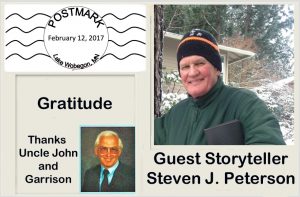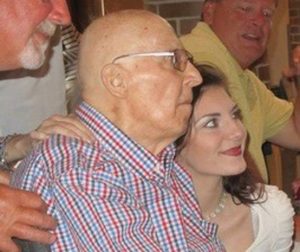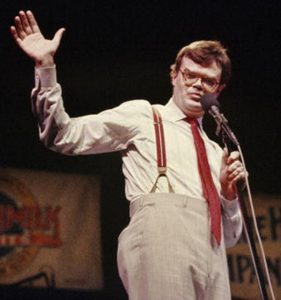Gratitude
Sandburg— 
Or“Complaint is a mainstay of comedy,
so I am now experimenting
with a comedy of gratitude,
talking about parents, teachers,
lucky breaks, dumb things
that turned out smart.”
— Garrison Keillor
Watch out for “gum chewers,
cigarette suckers, and cosmetic users.”
— Uncle John
Thanks Uncle John and Garrison
On April 28, 2017, Garrison Keillor will perform at Concordia College, across the street from the Prairie Home Cemetery, in Moorhead, Minnesota, for what he is calling his “Gratitude Tour.” It is the Prairie Home Cemetery that Keillor credits for the inspiration to name his radio program.
In a recent Prairie Home Productions news release, Keillor wrote, “Complaint is a mainstay of comedy, so I am now experimenting with a comedy of gratitude, talking about parents, teachers, lucky breaks, dumb things that turned out smart.” My Uncle John would have loved to drive from his house about a mile over to Concordia to listen to Keillor’s comedy of gratitude.
From 1974 to 2016, Keillor hosted over 1500 Prairie Home Companion radio shows. That’s an astonishing number. Who knew so much could happen in a small Minnesota town out there on the edge of the prairie?

At his 90th birthday celebration, Uncle John with granddaughter Julia.
In August of 1974 I was introduced to the Prairie Home Companion radio program by my Uncle John a week or two after he first heard it on the local Minnesota Public Radio station, KCCM-FM, at Concordia College. He graduated from Concordia in 1952; I graduated in 1971. Uncle John brought his bulky AM/FM portable radio out to the picnic table in his backyard so we could listen to his recent discovery where we were eating corn on the cob and hot dogs on a humid Saturday evening. Prairie Home Companion first aired on July 6, 1974, and was broadcast on Minnesota Public Radio from Macalester College in St. Paul, not far from where Uncle John grew up with a younger brother and sister.
He was born in 1925, and after graduating high school from Minnehaha Academy in St. Paul, he entered the Navy to serve during World War II. In 1945 he was stationed at the Livermore Naval Air Station. When he and his wife Margaret visited me in the late 1980s in Livermore, we drove down East Avenue past Lawrence Livermore National Laboratory which had been the site of the Naval Air Station. Uncle John was very surprised that many buildings from when he was stationed there were still standing.
His parents died in a small plane crash in 1947 near Buffalo, Minnesota, and that tragic, life-changing event brought Uncle John and his brother and sister to Moorhead to live with an aunt. He attended Concordia, where he majored in biology, and found the professors to be especially welcoming and very supportive. All of his life he was a loyal alumnus.
This past July, two weeks after the last broadcast of Prairie Home Companion with Garrison Keillor, my Uncle John celebrated his 91st birthday. Parkinson’s disease had greatly reduced his ability to speak. His voice was weak and muddled but his intention to engage in conversation was strong. He always wanted to tell me a joke, he always wanted me to laugh, and he always wanted me to listen to “good” music, which for him ranged from a Bach hymn to songs by the Eagles.
Uncle John loved telling Norwegian jokes especially the ones about Ole and Lena. I can hear his laugh at the punch line when he told the one about Ole and Lena being married for 65 years, and Ole recounts how Lena had been with him through all his medical problems from gall bladder surgery to liver cancer, and then concludes, “Lena, I’m beginning to think you are bad luck.” Uncle John, who had been married to Margaret 64 years when he died this past September, appreciated the gift of a life-long partner with a tolerant sense of humor.
He was familiar with many communities like Garrison’s Lake Wobegon. During his career as a pharmaceutical sales rep in northern and western Minnesota, Uncle John loved talking with the local doctors, nurses, and patients, then heading to a nearby restaurant much like the Chatterbox Café in “real” places such as Ada, Bemidji, Elbow Lake, Pelican Rapids, and Thief River Falls.
I enjoyed that first broadcast I heard in 1974 at that backyard picnic table even though there was no news from Lake Wobegon. Keillor did not introduce listeners to the news from where all the women are strong, all the men are good looking, and all the children are above average, until 1977 while I was living in Europe.
In 1980 Prairie Home Companion began broadcasting to a national audience, so, when I returned to the United States in 1981 and was teaching in West Lafayette, Indiana, I was pleased to hear that the program Uncle John had introduced to me seven years before was thriving. Purdue University’s WBAA-FM aired the show every Saturday evening. Of the many amusing “sponsors” of Prairie Home Companion such as The American Duct Tape Council, Bob’s Bank (Save at the Sign of the Sock), The Fearmonger’s Shop, Raw Bits Breakfast Cereal (Oat hulls and wheat chaff — not for everybody), Powdermilk Biscuits (Heavens they’re tasty, and expeditious), I recall a phone conversation long ago made memorable by Uncle John’s asking the key question posed by one of the sponsors, “Wouldn’t this be a great time for a piece of rhubarb pie?” then singing (to the tune of Shortnin’ Bread) the Bebop-A-Rebop Rhubarb Pie jingle: “One little thing can revive a guy, And that’s a piece of rhubarb pie. Serve it up hot, maybe things aren’t as bad as you thought. Momma’s little baby loves rhubarb, rhubarb, Bebop-A-Rebop rhubarb pie.”
Keillor reported the News from Lake Wobegon with characters that were reminiscent of my relatives and friends and acquaintances while growing up in Minnesota. I suggested to my Purdue University students and colleagues that they listen to the program. One of my colleagues, a fellow Minnesotan, was an enthusiastic fan of the Prairie Home Companion. She had attended Gustavus Adolphus College, the home of the Gusties and a Swedish Lutheran liberal arts college, in St. Peter. I had attended Concordia, the home of the Cobbers and a Norwegian Lutheran liberal arts college, in Moorhead. We had a spirited, humorous rivalry about Gusties and Cobbers, and about Swedes and Norwegians. We had a common history of the folks we knew living in places like Lake Wobegon. Another Purdue colleague from New York City, proud of his Russian and Jewish heritage, was charmed by Keillor’s storytelling. He wanted to know if what Keillor said was true. He asked questions about unfamiliar things such as Luther League, lefse (a potato bread that looks like a tortilla), and ice fishing. We assured him that everything Keillor said accurately reflected the experiences we had in “real” Minnesota towns.
I have recommended Prairie Home Companion to many people since the early 1980s. I was always confident that the two-hour radio program was worth anyone’s time because of its variety of music, humor, and weekly news about people living on the edge of the prairie, in the little town that time forgot out there in central Minnesota’s Mist County.
In 1984 when I left Purdue for a career at Lawrence Livermore National Laboratory, I liked telling my new colleagues including Dan Sapone about Prairie Home Companion. Everyone I told had a favorable response and especially to the News from Lake Wobegon. Dan valued Keillor’s storytelling so I was grateful, then, and even more so now, that he taped the presentation Keillor gave at the National Press Club in 1987. I am pleased that I have kept the cassette tape, and I have listened to it numerous times.
In 1987 Keillor left Prairie Home Companion for 26 months. He explained that he had become too famous because his radio show had four million listeners. He could no longer live in anonymity, which as a shy person he wanted to do. He married his former high school sweetheart, an exchange student from Denmark, and moved to Copenhagen in the summer of 1987.
On Tuesday, October 20, 1987, Keillor appeared at the National Press Club in Washington, D.C., to promote his latest book, Leaving Home, a collection of monologues from the Prairie Home Companion. Dan taped that program for me while I was visiting the Oregon Shakespeare Festival in Ashland. It was the week that the Dow dropped 508 points (22.6%, down to 1738.74) and the Minnesota Twins were in the World Series for the first time since 1965.
In his formal comments to the National Press Club about the drastic drop of the Dow Jones Industrial Average on Monday, October 19, 1987, Keillor said, “We think the stock market crash is catastrophic but we are not sure. Is this the worst that can happen? We don’t know that. The newspapers are using second-coming type face. One says Panic! And the other says Crisis! But people back home in Minnesota are not affected by the 500-point drop of the stock market, rather they are riding high because the Minnesota Twins are in the World Series, playing the St. Louis Cardinals. We are a different kind of baseball fan. New York fans demand triumph. While in Minnesota we believe that whatever happens is probably our fault. We were brought up to wait and see. We believe that all things come to those who wait. Twins fans. Democrats. Investors. It will come around again. In 1980 I believed that Reagan could not be elected President of the United States, and in 1984 I believed that Walter Mondale could beat him. As 1988 approaches I believe that Ronald Reagan cannot be elected to a third term. Eventually you win.”

In the question-and-answer segment at the National Press Club, Keillor was asked if he missed his radio show. He replied, “I miss it terribly. I miss singing songs with people who know the words. I have found out that a storyteller has to keep working.” Fortunately, for his listeners he returned to the Prairie Home Companion in 1989. Keillor claimed that “eventually you win.” These days it is harder to believe that. We do not know the future. We do not know what is the worst that can happen.
In a July 26, 2016, New York Times column, Keillor wrote: “We made our mistakes back in the 20th century, Lord knows, but we never nominated a man for president who brags about not reading. … When I envision a Trump Presidential Library, I see enormous chandeliers and gold carpet and a thousand slot machines. God help us. I mean it. We’re in trouble down here.”
Uncle John enjoyed mimicking an old-time, extremely conservative Lutheran minister with a thick Norwegian accent warning the world about the dangers and evils of “gum chewers, cigarette suckers, and cosmetic users.” It was an amusing, attention-grabbing line because of his powerful voice and his twinkling eyes. I will always remember his warning about the untrustworthiness and dangers of these reckless people. Nowadays they do not simply chew gum or smoke cigarettes or put on cosmetics, rather they say things they do not mean.
When we celebrated Uncle John’s 90th birthday on July 18, 2015, he was wheel-chair bound, but his bright eyes assured us that he was ready for his party. He could barely speak because of Parkinson’s, but we were amazed and delighted that he could sing along with the Eagles’ “Peaceful Easy Feeling.” There wasn’t a dry eye in the room when he surprised us with his ability to sing.
Printed on the inside cover of the program for his funeral service last September: “A good fisherman knows a keeper when he sees one, he knows when to toss one back, and when to head for home.” Uncle John was a good fisherman. He appreciated the camaraderie or solitude of fishing on a lake or along the banks of a river. He enjoyed talking with other people and always found a way to find common ground. He had an infectious laugh and loved to tell a good joke. Even a bad one if it would make you groan. He always expressed gratitude for his wife and children and grandchildren, and for any day or evening he could go fishing.
Back in 1987, Keillor affirmed that a storyteller needs to work. Thirty years later in 2017, he continues to work and Uncle John would have loved to attend the Gratitude Tour this upcoming April. I suspect he would have especially wanted to hear Keillor talk about “dumb things that turned out smart.” I know Uncle John could tell a lot of stories about that.
![]()
Click here to download a PDF of this post: Peterson_ConVivio_Gratitude_2:13:17
Thanks for the lovely tribute to your Uncle John and Garrison Keillor. The Prairie Home Companion will never be the same…but who knows?
Dorty,
I will pass your comment on to Steve Peterson, the author of this post (it was his Uncle John).
Thanks for reading.